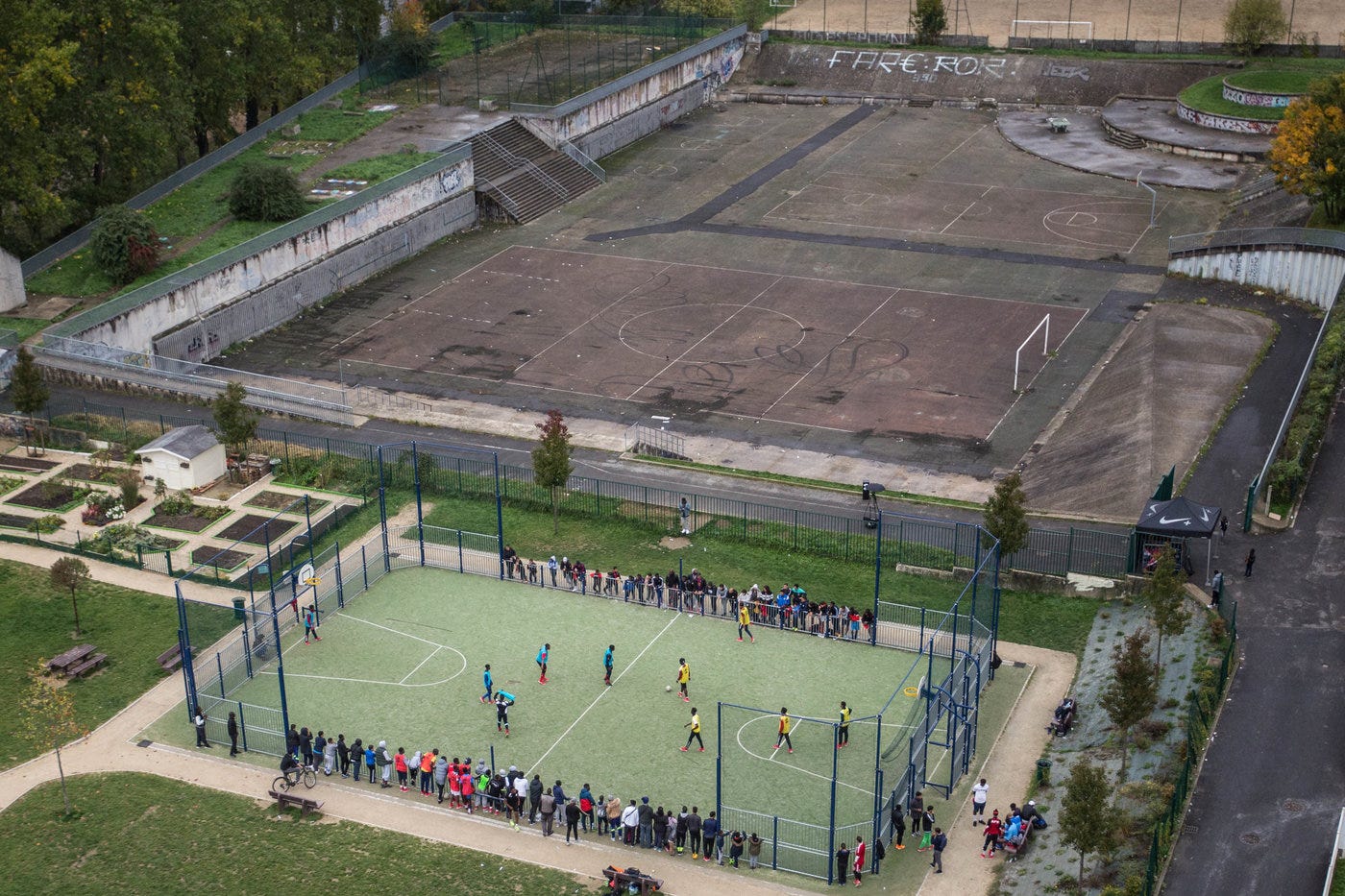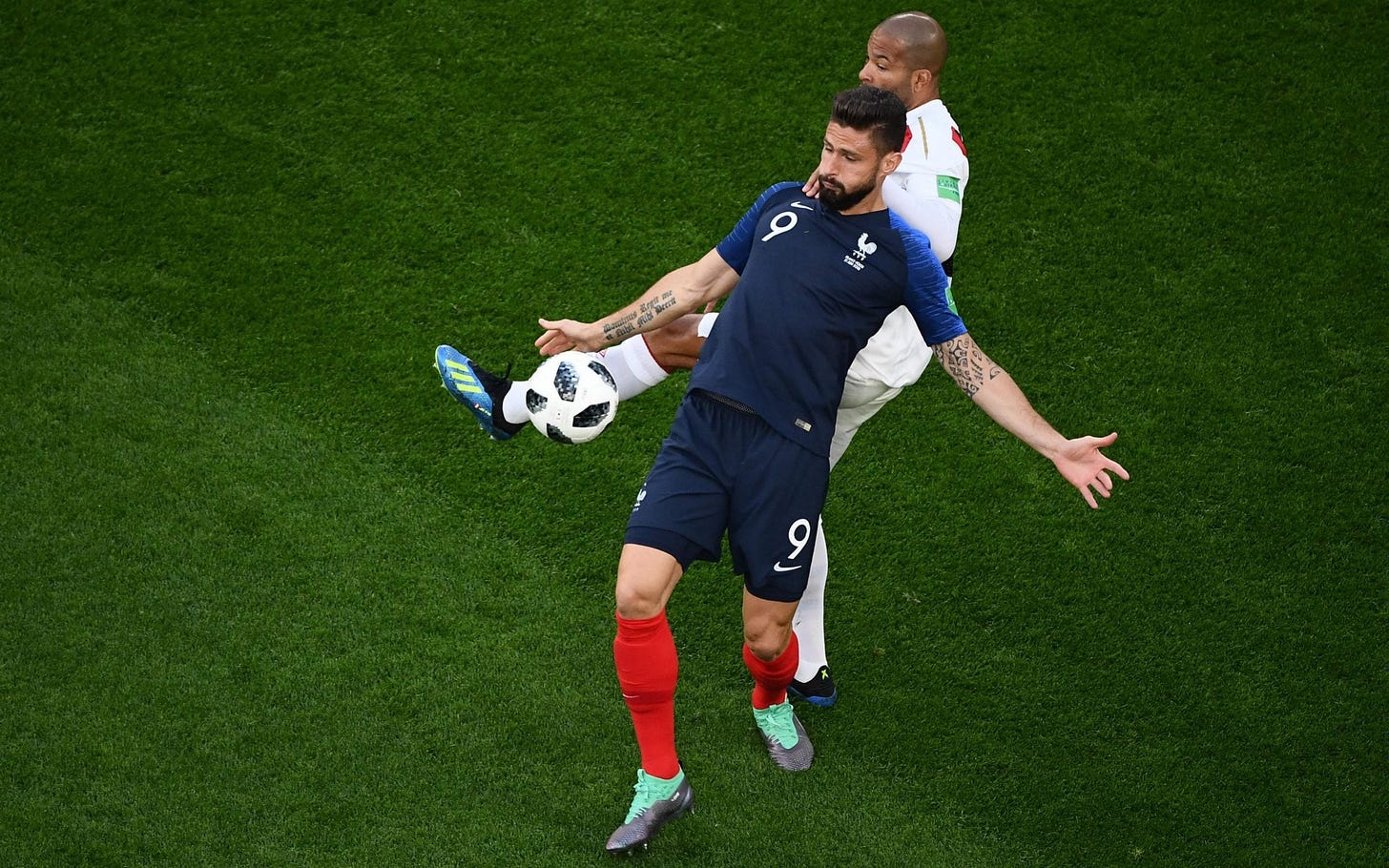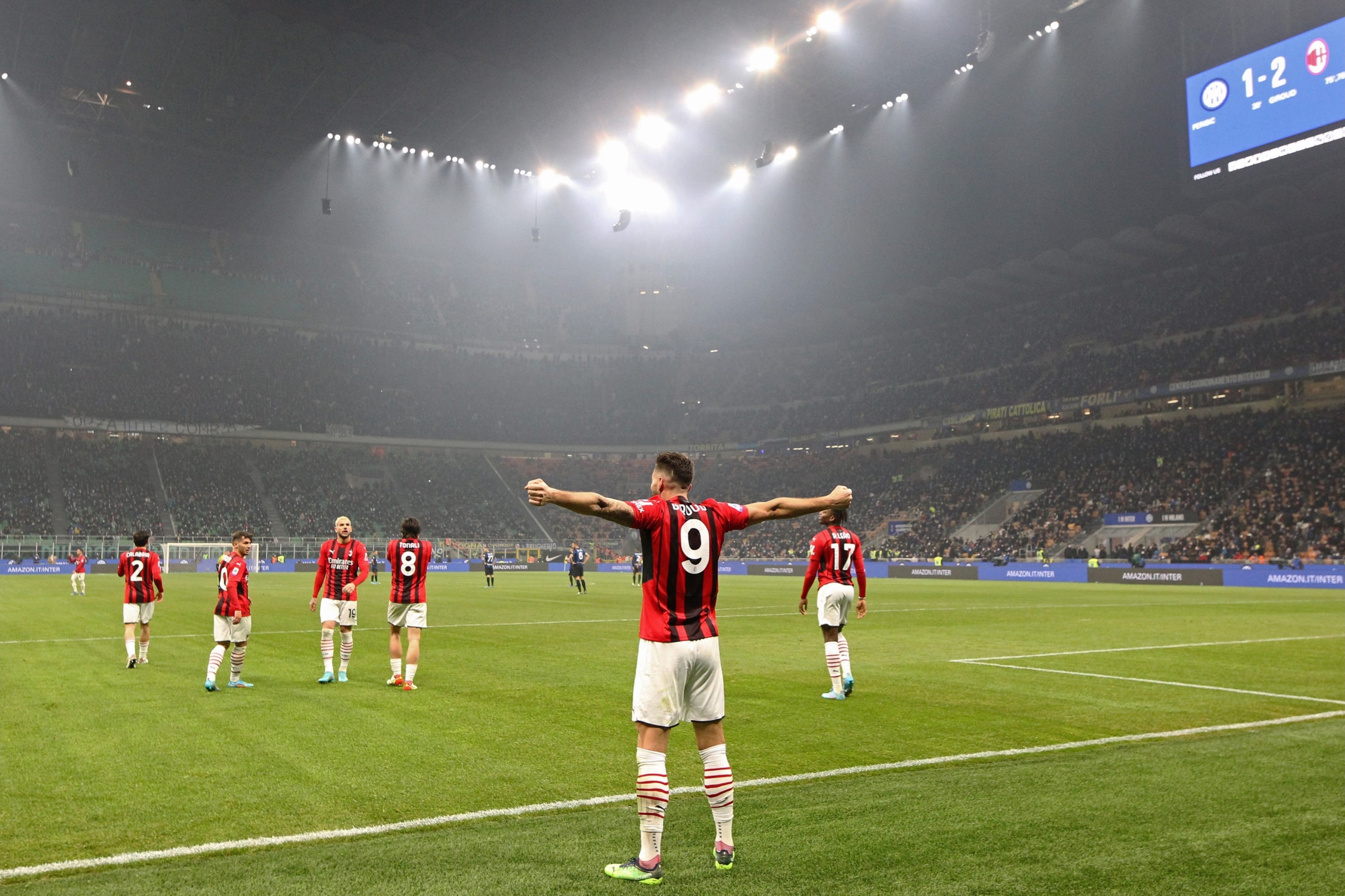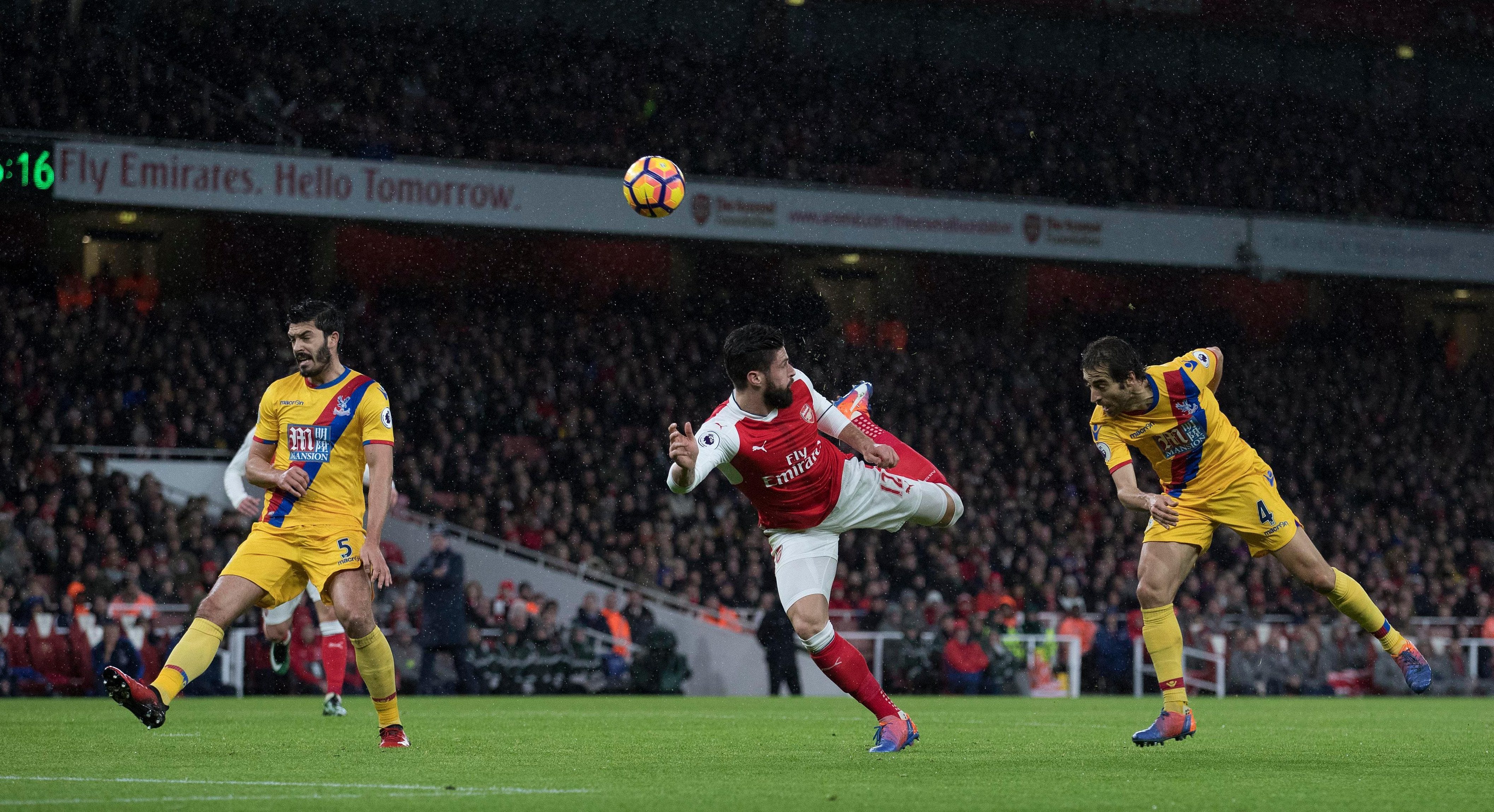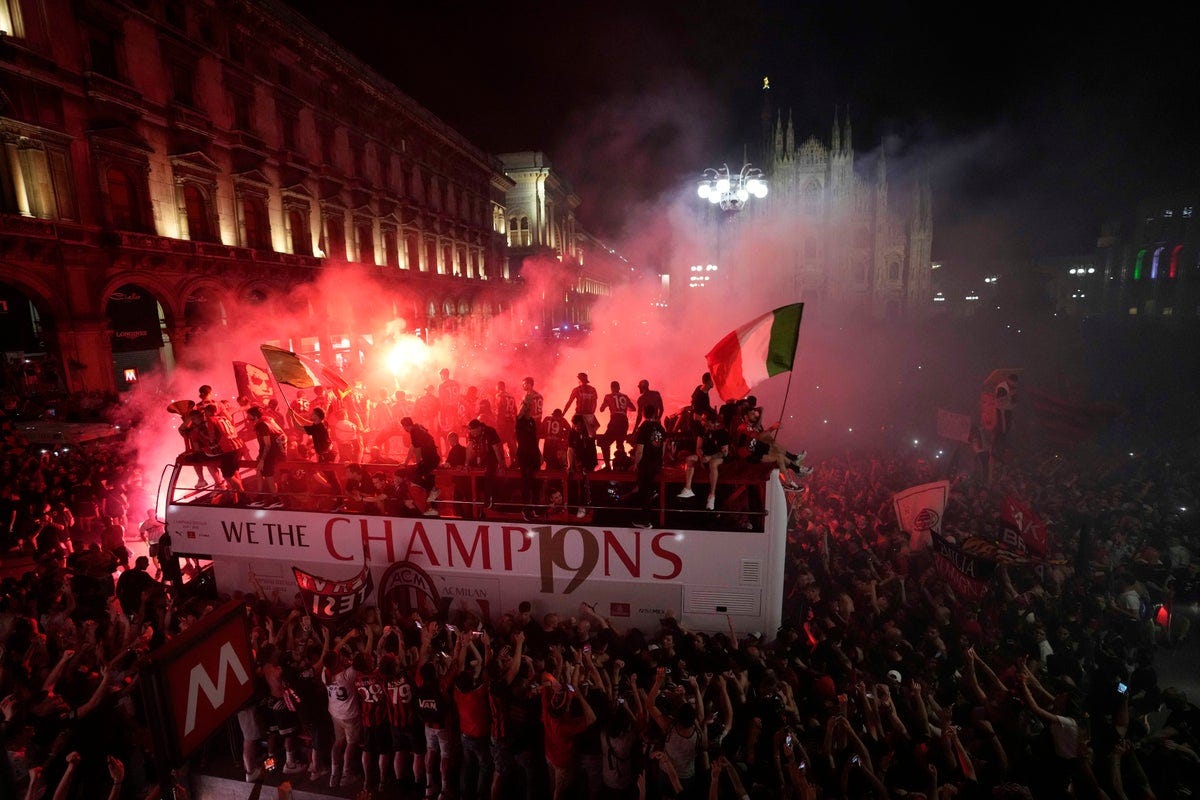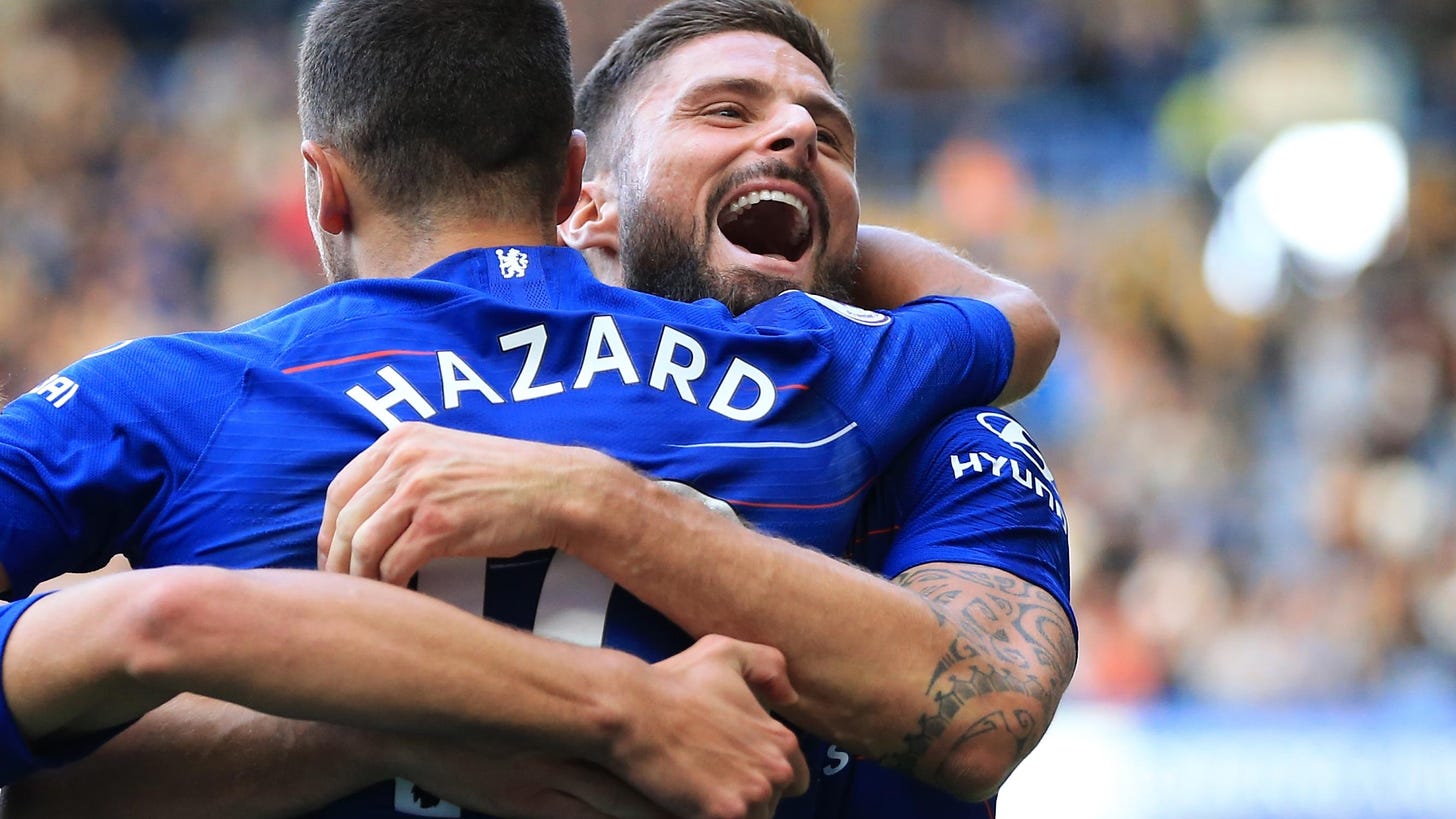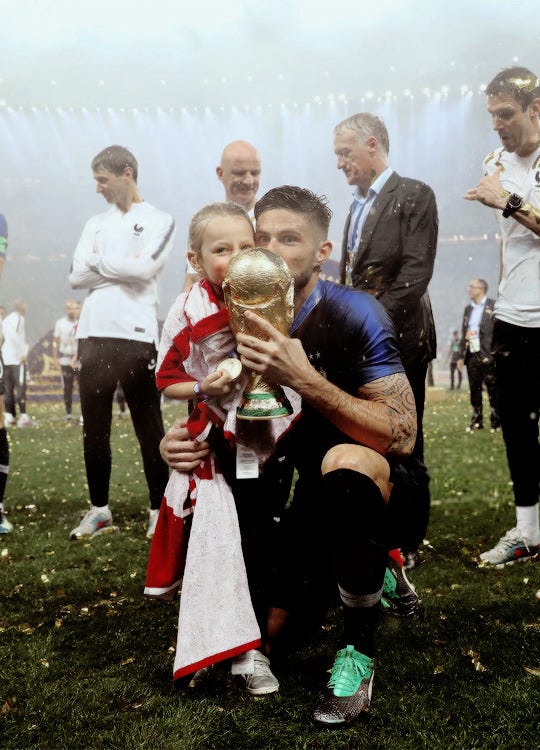So then? We can* be champions with Giroud on the team
From the church with his mother at 4 years old to winning the World Cup in 2018 — on Olivier Giroud and why he now deserves his roses, and in abundance.
You don’t choose your partners in a club. It’s like a second family.
A single thread binds many of the greats together, country-by-country.
In Brazil, the expressive, smile-on-the-face flair is the thread by which their greats, the likes of Ronaldinho and Ronaldo Nazario, are bound.
In France, the French footballing archetype is one that has shifted in style over the last few decades. The French footballer blends a mixture of influences, taking inspiration from cultures born in all corners of the globe.
Prominent to newer France are children of football that grew up playing street football in the hood’s concrete stadiums — from Zinedine Zidane, to Paul Pogba, to Ibrahima Konate.
Careers are accomplished in ‘ballon sur bitume’, or concrete football, prior to taking their first step into traditional, grass stadiums.
On Sunday the 15th of July 2018, many graduates of those very concrete pitches represented their nation at a sold-out Luzhniki Stadium.
The air thick, in palpable tension and heat alike.
Tick, tick, tick.
The score settles at 4-2. France falls to its knee in a mixture of relief and unbridled joy as the referee exhales into his whistle for the final time.
The clouds open up and rain begins to fall on the French.
20 years after their first triumph, Les Bleus are champions of the world, again.
The most prestigious position in football, although a subjective thing, probably falls to either the number 9 or the number 10. What is true, above everything else, is that the children of football love to attack, to dribble or to score and ideally both.
The 10 gets given the burden of possession, and thus the burden of responsibility, creatively: Lionel Messi, Maradona, Pele.
The 9 typically takes place centre-stage, as protagonist: the scorer, the match-winner, Ronaldo Nazarios.
To climb into the national team’s armour branded by either of these numbers is an honour bestowed upon very few. And to win one of the 21 prior World Cups in either one of these two roles embeds you firmly into footballing folklore.
It is as close to the universal dream for young footballing children to play as the 9 or 10, for their country, lifting the World Cup…
Olivier Giroud has played the role of contrarian, the odd one out, relative to his football peers through his entire footballing journey. Against all odds is an admirable story once, and twice is a rarity, but for France’s number 9 there’s never been a period of more than a couple of years before a seemingly insurmountable challenge presents itself.
‘This is who takes Giroud’s place, finally. It has been a good career and he outdid what people expected of him,’ are the echoes of newspapers, social media, and in the streets before Giroud, with an unwavering faith in God and a magical sense of timing, deservedly claws his way back into favour.
That’s been the Olivier Giroud way.
If you’ve scrolled conversations about the Frenchman, you’ll surely have come across something along the lines of, ‘if you just looked at a video of Giroud’s best goals, you’d think he had the career of an all-timer.’
Whilst true, it’s a reductive statement. It reduces Olivier Giroud’s career to something that is not one for the history books when he deserves a paragraph or two within it. Giroud’s museum of goals are only part of the story. This is a player who has achieved as close to it all, and in part down to the fact that he’s been an impressive footballer and valuable profile. We have to highlight this easily missed fact.
Focused inspection of Olivier as both a person and player reveals two things. The first being an interesting parallel between his footballing role and his personality as a human being. The second being this sense of connectedness in Giroud’s story. Every loose end seems to tie up beautifully and almost poetically, in a way that feels scripted. There’s numerous examples of this, I try to weave a few of them into this piece but for brevity, I’ve left out a few genuinely lovely storylines. Perhaps I’ll revisit them in another piece.
Giroud holds central to his entire being, a belief in God, which has been the case for as long as Giroud’s conscious memories go back. From as early as the age of 4, Giroud would attend the church on Sunday mornings alongside his mother and year on year, this faith would continue to strengthen. Perhaps Giroud would attribute the aforementioned connectedness and the ‘lucky coincidences’ to God. Given how many of these stories line up, a higher power probably explains it better than anything secular might.
For many people, being doubted as many times as Olivier has would result in an eventual acceptance, especially this late into a career. At 34, being a rotation striker for Chelsea is a role most would accept whole-heartedly but this was never the Olivier Giroud way.
The transfer window of January 2020 opened with Giroud adamant on a transfer away from Chelsea. Frank Lampard and the striker he innately favoured, Tammy Abaraham, meant Giroud was placed as an often unused bench option.
It echoes the story of Maurizio Sarri and his preferred favourites in Higuain or Morata. Prior to that, Giroud had taken the leap to Stamford Bridge following Arsenal’s big money moves for Alexandre Lacazette and Pierre-Emerick Aubameyang. Prior to that, Karim Benzema sat in the driver’s seat for the national side, and so on. You get the point.
That winter transfer window was a mocking month for Giroud, who pushed for a move to Inter Milan for weeks on end. Although Inter Milan wanted Giroud, Chelsea insisted on a replacement third-choice striker to take Giroud’s place, behind Tammy Abraham and Michy Batshuayi, before they allowed the Frenchman to leave and Giroud’s hopes for game time, which directly correlated with his chances of playing at the upcoming Euros, faded.
How this saga resolves illustrates the beauty in remaining well-intentioned and holding an unwavering belief that things will work out. As a person of religion myself, I’ll attribute it to God like Olivier does, but irrespective of religious or non-religious belief, there’s beauty in the resolution for everybody.
Following the breakdown of Giroud’s transfer to Inter Milan, he remained at Chelsea, plagued by feelings of uncertainty. Giroud’s incessant pestering of Lampard culminated with Lampard agreeing to offer him opportunities to play, upon which further game time would be earned on merit. There was a lifeline for Giroud who grabbed onto the chance with an unrelenting grip.
Giroud scored and performed well in continuous games, soon displacing first-choice Tammy Abraham. This hurdle like those before it had been cleared…
Pandemic.
A new, unprecedented challenge reared its head. It’s a continual story of peaks and troughs for Giroud but when football eventually resumed, and the season concluded, Giroud finished strongly with 6 goals in 7 starts. Chelsea cemented top four with a side many had written off on the backdrop of their transfer ban.
A subsequent Champions League campaign awaited but not before Giroud would be pushed down the pecking order again, this time behind big money acquisitions Timo Werner and Kai Havertz.
Like I said, never a period of rest or calm.
Tuchel placed Giroud out of favour but Olivier still played a key role in Chelsea’s eventual Champions League win. This was a Champions League campaign too, remember, that Giroud shared a fair responsibility in helping Chelsea qualify for at the tail end of the prior season.
To say Giroud is the understated, unsung constant in so many of his sides’ successes is a truthful assertion but Giroud punctuates his incredibly valuable yet humble role with some of football’s most outrageous goals. His Puskas Award winning scorpion kick is the exclamation point to a well-crafted, subtle sentence — an appropriate reminder that says, ‘Hey, I’m not just a facilitator, I’m still a number 9 at heart.’
The bicycle kick against Atletico’s villainous defensive shape acts as another of those memorable moments for both Giroud’s career and Chelsea’s Champions League winning campaign.
The season ended as Giroud, a non-starter, missed out on a starting place in France’s national side in the COVID-delayed Euros tournament. He would end up moving to AC Milan that very summer, a family settled in London accompanying him regardless, in search of greater game time, knowing his story was unfinished. And that road lead to Derby di Milano.
Anybody with a grain of footballing appreciation understands the gravity of this historic occasion on any weekend but in February 2022 it was presented with raised stakes.
AC Milan, in fine form, 11 years without a league title played their rivals, enemies in war, who at that point sat atop the league.
Olivier Giroud leads the team, uniformed in those iconic red and black colours that his striking inspiration, Shevchenko donned all those years before him.
Inter Milan, the leaders, translated that lead into the individual match, going into half-time a goal up. In the 74th minute however, fortunes turned as Giroud put away the equaliser sliding into a zone that mirrored his first ever league goal for Arsenal. Connected. AC Milan might’ve taken a draw but Giroud in his powerful frame, only 3 minutes later, darted horizontally across the box — a gentle, beautiful, artistic Cryuffian flick, a touch that resembled his ex-teammate in Eden Hazard, freed him. Giroud then struck the ball, the energy behind the strike brought him crumbling down in the opposite direction as the ball nestled into the bottom corner. AC Milan 2, Inter Milan 1.
The story, in this fairytale way, resolved with Giroud’s AC Milan lifting the league title by a mere 2 points ahead of…almost-Giroud’s Inter Milan.
In the moments of those transfer window pleas, there would’ve been natural feelings of lost confusion but it was a story that reached a crescendo in the form of a Scudetto for their city rivals. Hold the faith, work hard, be ambitious. It’s a story that the most poetic of scriptwriters would struggle to author. It’s certainly not a story that Giroud would’ve foreseen in January 2020.
In buying his time prior to his eventual transfer, Giroud remained assured with good intentions and a concrete faith — in Islam we call it Tawakkul or ‘the perfect trust in God’s plan and a reliance on Him alone.’ I’m sure there’s a similar idea in other religions whether or not there’s a specific word for it. Regardless, Giroud committed entirely to the Chelsea project and reaped the rewards for it. Equally, that selflessness is a quality that extends into Giroud’s on-field footballing game.
Eden Hazard once described Giroud as the best target man in the world, somebody he could play off of, and Kylian Mbappe expressed this feeling alike, feeling liberated by Giroud’s central, physical presence and link-play.
“I have a lot more freedom here. The coach knows that there is a number nine like Olivier who occupies the defence. Me, I can walk around, go into space, ask for balls… In Paris, there isn’t that, it’s different, I’m asked to do the pivot.” — Kylian Mbappe (on Olivier Giroud and France).
The naturally generational types in both Eden and Kylian fostering a chemistry, that brought great success, with Giroud actually illustrates the quality he has. The best in football, a team sport, are those that can maximise the chances their team succeed and Olivier has always done so.
Although it’s changing a little now, fans have previously focused very heavily on the flashy, on-the-ball actions. That perspective would’ve explained some of the questionable takes on Giroud’s game by social media fans and journalists alike but coaches approach football differently and have, with good reason, always valued Giroud’s immense quality.
As I continue to develop my understanding of the beautiful game, what becomes more evident is how football is simply an expression of humanity, of the stories these individuals, whether it be players or coaches, have experienced over decades. The upbringing of a central forward player, from a certain town, with certain religious values, and the lessons learnt from specific friends can all be seen in the style of play, the success and the manner a footballer boasts.
Olivier has always carved out a place for himself — a spot he is needed in, despite others not initially seeing it. As an almost odd-one-out figure, he’s found himself being this perfect counter, providing balance to many of those around him. The concrete stadium footballers, who grew up in the suburbs of Paris to immigrant parents are a far cry from Giroud’s swimming pool and apple tree having home in Froges but this doesn’t act as a deterrent for anybody involved. In fact, Giroud’s complimentary role as this link-play, supportive pillar of a striker translates into everyday life where Giroud is similarly a person of a warmth, humility and supportive non-confrontation. There is this altruism in his footballing game that is in born through his personal life experiences — a selflessness married to resolute work-ethic.
‘You don’t choose your partners in a club, the coach is the one who builds the team, (street) soccer teams are of all ages. It’s like a second family.’ [Ballon sur Bitume]. This the principle upon which the playground footballers play. It’s a quote directly from Ballon sur Bitume, a documentary about France’s street football culture.
Remember the aforementioned connectedness in most things Giroud? Well, without hearing the street footballer’s quote, Olivier matches his sentiment applying it instead to the national team. Identically, Giroud has described the French team as becoming ‘a second family’, with a focus on the age disparities that become irrelevant in a family setting — the ‘old guard, (that he has) formed close relationships with, Lloris, Koscielny, Debuchy (and the young players) Hernandez, Pavard.’
Giroud too specifically mentions Pogba, Griezmann, Matuidi, and Varane, with these four being brothers that Giroud has developed a closeness with through highs and lows that certain family members may never even reach.
Giroud’s footballing excellence is something to sit back and watch with pride and delight, but it is his expression as a person and knowing how this informs his footballing profile and subsequent relationships, that I particularly love.
If you were to ask Giroud, he’d probably tell you that it’s not entirely deliberate or calculated and that he does those things on a football pitch because they feel natural, but…they feel natural because of the human being he is.
Olivier Giroud’s story is very little like, for example, the expressive child from the hoods of France in Paul Pogba but they both prescribe to the notion that football creates you a family — a brotherhood. Football is this incredibly powerful, societal thing that binds people together irrespective of age, race, economic or social background. In a sense, that is a big part of the beauty in certain religious expression too, this idea of unity and multiculturalism.
The more both football and society can cultivate harmony whilst allowing people to feel comfortable expressing themselves, the better both environments become. What is undoubtedly true is that Olivier Giroud has done both, as a selfless, talented central pivot who has remained grounded and welcoming, despite achieving a level of success that has tempted many a celebrity away from said straight path.
Sure, Olivier Giroud is unlike many of the players that receive unanimous vocal praise throughout their career. Giroud is not the dribbling, flashy, possession-heavy, agile winger. Giroud is not a player that is showered in public campaigns that aim to portray him in this superstar light for the sake of it either. But Giroud is an honest, hard-working talent who has stayed true to set rules that have held him in great stead throughout a wonderful career.
There have been many doubters at every step of the way and it would have been easy for Giroud to lose belief or react with anger, wondering how much more he’d have to do to finally convince people.
As I pen the final words to this piece Giroud has just been selected as part of France’s World Cup squad of 2022. The Frenchman lives only two goals away from achieving the record for the most goals of all time for France, a truly ridiculous feat to be so close to achieving. And, this is all on the backdrop of impressive 2022 form that most recently saw Giroud induct himself into the record books again, as the oldest player to register three goal contributions in a Champions League game.
This piece reads almost as if Giroud has recently retired given the career-long reflections and complimentary nature of it, but make no mistake, the veteran striker still has records that remain to be broken, ready to be broken.
Van Dijk’s words were telling and summarise the Olivier Giroud story better than anybody could. After naming him as his hardest opponent faced, Van Dijk ends by saying:
‘I feel like I got him but in some way he always managed to score.’
And isn’t that the Giroud way we’ve been talking about this entire time? At every hurdle, at every challenge, with every transfer, they feel like they have him but…in some way, he always manages to score.
After the final whistle of the World Cup final in 2018, Deschamps’ assistant, Guy Stephan, mocked critical narratives and asked Giroud:
‘So then? We can’t be the champions with Giroud on the team?’
A 16 year and counting career proves otherwise.
An Article by Umir.



